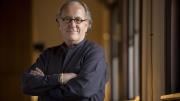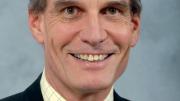Editor's note: This story has been updated on September 22 to incorporate an interview with Wendy Kopp, founder and CEO of Teach For America, one of the partner organizations for the new education doctorate.
Harvard Graduate School of Education (HGSE) today announced its new doctor of education leadership (Ed.L.D.) program, a three-year, practice-oriented degree aimed at preparing a small cohort of leaders who can effect major changes in K-12 education.
HGSE dean Kathleen McCartney said in an interview that the new program aims to teach its students “how to create change, how to be entrepreneurial, how to create a strategy and really stick with it.” Her very vocabulary underscored the difference between the new course of study and traditional Ed.D. (doctor of education) degrees, which are research- and dissertation-focused. Although the means differ, she emphasized that the Ed.L.D. graduates’ goal is consistent with HGSE’s purposes as adapted to challenging new circumstances in primary and secondary education: “Everything these leaders do should have a laser-like focus on learning.”
A New Curriculum
The unusual curriculum--based in part on current HGSE-led executive-education programs for superintendents, principals, and other K-12 leaders--suggests the rationale for the school’s first new degree in 74 years. First, it aims to equip its graduates with expertise in teaching and learning, organizational management and leadership, and command of policy and politics. Accordingly, it links HGSE faculty members with colleagues from Harvard Business School (HBS) and Harvard Kennedy School (HKS), and scholars with practitioners. The Ed.L.D. program thus explicitly recognizes that superintendents, state education policymakers, nonprofit advocates of school reform, and even private investors are all involved in enhancing education—and that the leaders in each sector need to master multiple skills and disciplines, not just education content. (Curriculum development was supported by the Gates, Hewlett, and Noyce foundations--all heavily involved in improving public education.)
Second, after two years of work on campus, each student enters a mandatory field placement, at venues ranging from large urban school districts (Atlanta, Boston, Chicago, Denver, New York, etc.) to nonprofit organizations such as the New Teacher Project, the New Schools Venture Fund, and Teach For America. (For Teach For America founder and CEO Wendy Kopp's perspective, see below.) During their year on site, the doctoral candidates will lead an education-reform project, prepare a “capstone” product, and have hands-on experiences building and leading a team--and evaluating the performance of others and having their own assessed.
Attracting New People to Careers in Education
“Sometimes people think education is an intractable problem,” McCartney said, citing the scale of the issues, the flood of unanalyzed data about students’ performance, and the apparently inadequate American level of learning revealed on tests administered around the world—not to mention the daunting gaps in performance between and within U.S. districts.
The Ed.L.D. attacks that challenge in two ways. First, its breadth addresses all the skills education leaders will need to draw upon, without requiring them to pursue separate degrees in education, management, and policy. Second, McCartney said, it solves “a human-capital issue” by opening a path for students who seek education careers but shy away from the six-year research doctorate and cannot envision how to navigate from an M.B.A. or J.D. into their preferred field of practice.
Focusing on Problems--and How to Fix Them
The Ed.L.D.’s faculty co-directors embody its ambition to combine substantive content with practical application. Anrig professor of educational leadership Richard Elmore described two strands of work that underpin the new curriculum. More than a decade of research, at Harvard and elsewhere, on accountability, school improvement, and school organization has become “increasingly specific," he said, "about the conditions that promote high-level learning and performance in educational institutions,” within classrooms and in systems as a whole.
The work of public schools, he said, is “highly compartmentalized, disorganized, and incoherent,” largely as a result of historical forces that have shaped education. In response, school systems and education leaders need to define coherent strategies for improvement, specify the elements of each strategy, and detail the actions required to implement them, Elmore said. The latter might include investing in the system’s people, building accountability systems, rigorously allocating how educators spend their time and how schools spend their financial resources, updating organizational structures--and figuring out how to explain all these changes to the public. The problem, he said, is not that teachers are withholding their knowledge of how best to teach; rather, the issue involves continuously improving teachers' knowledge, applying what they know, and assessing performance.
At the same time, HGSE collaborations with HBS and HKS begun during this decade have opened the way to apply those research findings to effect change in large school systems. The Public Education Leadership Project (PELP), an HGSE-HBS venture, developed a case-based executive-education curriculum for superintendents and principals from large urban school systems. (PELP alumni include Arne Duncan '86, former superintendent in Chicago, now U.S. Secretary of Education.) Week-long campus sessions, and field consultations by Harvard faculty members, introduced training in strategic alignment, executing a strategy, managing human capital, and designing systems for resource allocation and accountability measures.
Since 2006, the Wallace Foundation has supported a separate initiative, called the Executive Leadership Program for Educators (ExEL), to provide training on campus and in the field for teams of school-district leaders and the leaders of their state education departments (two states each year). The joint approach aimed to broaden the scope of possible changes in education by combining state-level policy with practice and application in operating districts and schools. ExEL’s faculty ranks include HGSE, HBS, and HKS members.
Given what scholars and practitioners have learned from those experiences, Elmore said, it was logical to extend the content and techniques of the executive-education programs into a regular degree course of study. Beyond superintendents and chief academic officers, he envisions enrolling people who will create entrepreneurial training organizations (nonprofit and for profit), organizations that will support charter schools, people interested in funding innovation, and other services--hence the breadth of the partners for students’ third-year placements.
Professor of practice Lewis (Harry) Spence, J.D. ’74, faculty co-director of the program with Elmore, brings that hands-on perspective directly into the design of the Ed.L.D. From 1991 to 1995, he was receiver for Chelsea, Massachusetts, where restructuring the school system was a principal priority. Thereafter, he was deputy chancellor for operations of the New York City board of education, and then commissioner of the Massachusetts department of social services.
School systems are “easily pulled in a thousand directions,” Spence said. In common with the leaders of other public institutions, education executives spend 80 percent of their time on politics and administration, and only 20 percent on improving practice and the services delivered, he noted. Reversing that ratio, in his view, is the key to “genuine transformation” of education. The Ed.L.D. intends, above all, to show education leaders how to achieve “an intense focus on improving practice”—not on the details of budgets, legislation, or placating city councils and parent-teacher organizations, but rather on ways to enhance teachers’ learning and their classroom effectiveness. Well-prepared leaders, Spence said, will strive to assure that “every single action [they are] engaged in supports that strategy,” marshaling resources to raise students’ achievement, to close the gaps in achievement, and to address effectively issues of race and identity that lie at the heart of urban systems’ achievement gaps.
These are tough challenges that cannot be overcome by “education rhetoric,” Spence acknowledged. Rather, successful systems demonstrate that the key factors in success relate to leadership, management, and organization--all lessons he learned firsthand and from leading ExEL for 18 months. By forming deep partnerships with the organizations where Ed.L.D. candidates will spend their third year, he said, HGSE could itself benefit from a “tremendous virtuous circle between the academy and practice” that will inform faculty members’ own knowledge and their ability to teach future education leaders.
"As we've engaged in this work over the past 20 years," said Wendy Kopp, of Teach For America (TFA), "we've seen that it is absolutely possible for kids in low-income communities to excel academically"--at the classroom level, school-wide, and even through entire school systems, demonstrating the "possibility of school-system-wide change." At each of those levels, she said, "Ultimately, it turns out, it's all about talent and leadership," in classrooms, the principal's office, and the superintendency. Throughout the education community, she continued, there is now widespread recognition of the "role of leadership in actually moving the needle against educational inequity."
In the TFA model, that begins with enlisting college graduates to sign up for two years, and helping them learn to teach successfully in challenging, low-income communities. The aim thereafter is to have some of those people, immersed in teaching practice, ascend to successively more challenging and responsible leadership roles. "What's the constraint to progress?" Kopp asked. "It's all about a talent constraint," as everyone working on educational improvement, from diverse perspectives, seeks "senior-level talent who have all the foundational skills." The Ed.L.D. program, she said, "promises to provide one more stream of talent who do have deep grounding" not only in education but in "relationship-building skills" that have to be applied in the very complex setting of education reform.
As TFA itself "works to become much bigger and much better," Kopp said, she could readily envision third-year Ed.L.D. candidates doing their placements at the organization and working on the critical problems involved in recruiting more, and more diverse, teachers; enhancing their training; and pursuing those teachers' own development as education leaders. All those goals, she said, involve problems of strategy, execution, and team leadership "on a significant scale"--and so seem tailor-made as learning experiences both for the doctoral candidates and for at least this prospective host organization.
Filling the Gap in Leadership Training
Heretofore, making education schools’ curriculums pertinent to the real problems of improving teaching and learning has been its own intractable problem. For the past decade, the Wallace Foundation has focused its education philanthropy (to the tune of $300 million) “exclusively around the notion that to make school reform work for kids, we need to spend much more time and attention on leadership,” said M. Christine DeVita, the foundation's president. Leadership training and effectiveness, she said, are “under-recognized and under-leveraged aspects of school life.”
The Wallace-supported work showed that the job of contemporary school principals has changed dramatically, DeVita said--but their preparation has not. Their most critical tasks are “leading organizational change, creating cultures of learning for the adults in the building, and leading instructional improvement for the children”--and “none of those sophisticated organizational changes and management issues are things they’ve been prepared for.” The weaknesses are particularly acute, she said, in professional training for principals, who are key actors in effecting school-level improvements: they are thrown into their jobs without mentors, any mentoring they get is passive and episodic, and they are subjected to inadequate or irrelevant performance assessments. Where these factors are altered, Wallace’s programs show, schools can improve.
School reform, DeVita said, is above all “a systems problem” and so requires systems thinking, “which is exactly what good leaders do in all sectors, and exactly what we’re asking education leaders to do, too.” But among education schools, “There isn’t anybody out there doing it in a way that’s worthy of the challenge--and that’s what’s so exciting about this program.” The kind of preparation and thinking she envisions for education leaders is “what’s taken for granted at Harvard Business School and Harvard Kennedy School,” which is why the Wallace Foundation originally underwrote the ExEL program to bring teams of superintendents and state education officials together. With such an approach now in place at HGSE, too, DeVita said, the foundation has followed up by making a $10-million grant for fellowships for the entering Ed.L.D. candidates.
Arthur Levine, another scholar of how school leaders are prepared--past president of Teachers College at Columbia University, now president of the Woodrow Wilson National Fellowship Foundation--has been a harsh critic of prevailing practices. In an interview, he characterized the quality of educational leadership programs as “very poor,” the very weakest of education schools’ offerings. He criticized low admissions standards; curriculums that “lack coherence and connections to the work that’s actually done in the field”; clinical programs devoted to mere shadowing of practitioners, whether they are successful or not; “watered-down” dissertations with little connection to practice; and a pervasive race among teachers to acquire credit for leadership courses, and thus boost their salaries, without any interest in actually assuming positions of greater authority.
Those compound failures are particularly disturbing, Levine said, “given the enormous changes that need to happen” in response to changed student demographics, the growth in student populations, new skills required for students to compete economically later in life, and the rapid evolution of technology. “We need administrators who aren’t simply managers of [existing] schools,” he said, “but who can create new schools.”
In that light, he said, the Ed.L.D. venture could be “a very useful model” for the entire country. He cited the combined immersion in education, organization, leadership, and policy practice, calling it “unique and critical to the kinds of leadership training required today.” He also pointed to the substantive third-year placement “in organizations known for their accomplishments” in school reform, and with “incomparable” attention to the quality and rigor of the experience. Throughout the curriculum, he discerned a focus on real problems, he said, an approach that “makes so much more sense” than generating more “watered-down dissertations.”
Finally, he said, it was important to elevate the status of training for practice to its own degree--to give it “an integrity of its own”--rather than subsuming it under the guise of a research-oriented education doctorate. If the new approach works, Levine said, he hopes it spreads through schools of education nationwide.
The Launch
The first cohort of 25 Ed.L.D. students is being recruited this fall, to enroll in 2010. They will do so tuition-free, and with stipends for living expenses, thanks to the gift for fellowships from the Wallace Foundation, among others. (Dean McCartney cited a $1-million fellowship fund given by former Harvard Overseer Paul Buttenwieser and his wife, Catherine.)
Elmore and Spence imagine that the applicants will have at least several years of experience working in some aspect of the “education sector,” broadly defined, who have demonstrated leadership in effecting some significant change or reform, and who come from diverse backgrounds and interests. Spence recalled students who have not been fulfilled by their separate course tracks solely within HGSE, HBS, or HKS, for whom the Ed.L.D. “suddenly answers their questions” about how to “genuinely prepare for the task of transforming large educational organizations, as much as humanly possible.”
A final check on the program’s design and aspirations is its executive director, lecturer on education Elizabeth City--herself a former teacher, principal, instructional coach, and then doctoral student at HGSE. Now she is an evangelist with a mission: to build from 25 Ed.L.D.s per year, to extend to the partner organizations where they will intern and the entities they ultimately lead, and ultimately to affect other education schools. City drew on her own background and on the intellectual framework of the new program to outline everything “transformative system-level leaders need to know” to reform education today, from learning about the origin of teacher unions and the evolution of de facto segregation in urban school districts (“These things didn’t just pop up”) to effective teamwork to comprehensive performance assessments.
Until now, City said, it has been up to prospective leaders to accumulate these needed skills on their own. With the Ed.L.D., she said, “We’re trying to do the integrative work rather than saying to the students, ‘Here, you put it together.’ ” They need all the help they can get, given the urgent mission of “transforming American education."
Read HGSE's news release on the Ed.L.D. More information on the program and curriculum is available at the new Ed.L.D. website.











